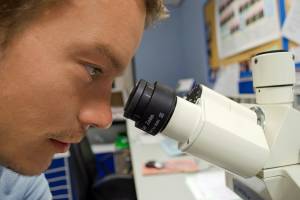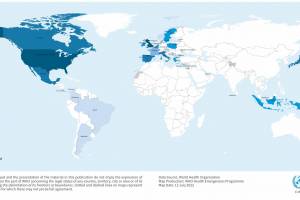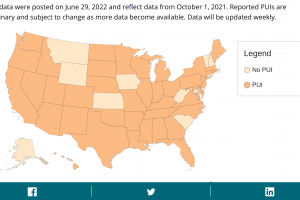Acute Hepatitis Children 2023
Acute Hepatitis in Children May 2023
The World Health Organization (WHO), the United Kingdom, Europe, Canada, and the U.S. Centers for Disease Control and Prevention (CDC) have reported acute liver inflammation infections of unknown etiology among children. Since the initial report in October 2021, the U.S. CDC has confirmed that 391 cases of an unknown cause are persons under investigation (PUI) in forty-four states, Puerto Rico, and Washington DC, as of April 12, 2023.
Among the reported PUIs in the U.S., about 90% required hospitalization, 6% needed a liver transplant, and 11 died. In addition, preliminary reports indicated that among PUIs receiving adenovirus testing, about 44% were positive. Although there have been previous reports of hepatitis in children with suppressed immune systems infected with adenovirus, adenovirus type 41 is not a common cause of hepatitis in otherwise healthy children. Some estimates suggest that 30-50% of hepatitis cases in children are from unknown causes. Of the pediatric patients with data regarding COVID-19 vaccination status, about 85% were unvaccinated.
Acute Hepatitis Cases 2023
Since its first identification in Scotland in 2022, and as of March 30, 2023, the following countries have reported over 1,000 pediatric patients with acute hepatitis: Austria, Argentina, Belgium, Brazil, Columbia, Cyrus, Denmark, England, France, Greece, Ireland, Italy, Japan, Latvia, Moldova, the Netherlands, Norway, Poland, Portugal, Scotland, Serbia, Singapore, Spain, Sweden, USA, Wales, and the United Kingdom.
Adeno-associated Virus Type 2 (AAV2) in Children
The journal Nature reported on March 30, 2023, a study used PCR testing, viral enrichment-based sequencing, and agnostic metagenomic sequencing to analyze samples from 16 HAdV-positive cases from October 1, 2021, to May 22, 2022, in parallel with 113 controls. In blood from 14 cases, adeno-associated virus 2 (AAV2) sequences were detected in 93% (13 of 14), compared to 4 (3.5%) of 113 controls (P<0.001) and to 0 of 30 patients with hepatitis of defined etiology (P<0.001). In controls, HAdV-41 was detected in blood from 9 (39.1%) of the 23 patients with acute gastroenteritis (without hepatitis), including 8 of 9 patients with positive stool HAdV testing, but co-infection with AAV2 was observed in only 3 (13.0%) of these 23 patients versus 93% of cases (P<0.001). Co-infections by Epstein-Barr virus, human herpesvirus 6, and/or enterovirus A71 were also detected in 12 (85.7%) of 14 cases, with higher herpesvirus detection in cases versus controls (P<0.001). Our findings suggest that the severity of the disease is related to co-infections involving AAV2 and one or more helper viruses.
Adenovirus Infections Children
Adenovirus has been the most frequently detected pathogen, noted in 193 (52%) of 368 cases in Europe, reported a study published by The Lancet Microbe on September 1, 2022. In children, adenoviruses most often cause infections in the respiratory system, but they also cause digestive tract infections. According to the CDC, there is no specific medical treatment for adenovirus infections, and antibiotics may not work on adenoviruses. Dr. Arun Kumarendu Singh, associated with AIIMS, Jodhpur, said, "Unlike COVID, children below ten are susceptible to Adenovirus. Among them, those below two years of age are more vulnerable," Singh told PTI over the phone on February 21, 2023.
Circovirus in Human Hepatitis
The U.S. CDC reported that in March 2022, a 61-year-old woman in France who had received a heart-lung transplant sought treatment for chronic hepatitis, mainly characterized by increased liver enzymes. After ruling out common etiologies, we used metagenomic next-generation sequencing to analyze a liver biopsy sample and identified an unknown species of circovirus, tentatively named human circovirus 1 (HCirV-1). We found no other viral or bacterial sequences. HCirV-1 shared 70% amino acid identity with the closest known viral sequences. The viral genome was undetectable in blood samples from 2017–2019, then became detectable at low levels in September 2020 and peaked at very high titers (1010 genome copies/mL) in January 2022. In March 2022, we found >108 genome copies/g or mL in the liver and blood, concomitant with hepatic cytolysis. In addition, we detected HCirV-1 transcripts in 2% of hepatocytes, demonstrating viral replication and supporting the role of HCirV-1 in liver damage.
Hepatitis Vaccines
Hepatitis vaccine news is posted at this link.
Acute Hepatitis Children News
May 1, 2023 - Inactivated Enterovirus Type 71 Vaccine Inlive® has been authorized for children in Indonesia
March 31, 2023 - The Conversation published an article that suggests strongly that AAV2, HAdV F41, and the immune response to one or both of the identified viruses underlie the cases of hepatitis seen around the world.
March 30, 2023 - @HelenBranswell Tweeted new studies found the presence of adeno-associated virus 2 (AAV2) in the blood and liver tissues of a number of affected children. They also identified the presence of adenoviruses or herpes viruses.
January 23, 2023 - The Institut Pasteur scientists identified a previously unknown species of circovirus, provisionally named human circovirus 1 (HCirV-1). In March 2022, they found >108 genome copies/g or mL in the liver and blood, concomitant with hepatic cytolysis. Furthermore, we detected HCirV-1 transcripts in 2% of hepatocytes, demonstrating viral replication and supporting the role of HCirV-1 in liver damage.
December 4, 2022 - The peer-review journal Vaccines published a study: Vaccine-Related Autoimmune Hepatitis: Emerging Association with SARS-CoV-2 Vaccination or Coincidence? Early diagnosis is mandatory and should be considered in patients with acute or chronic hepatitis after SARS-CoV-2 vaccination, especially those with pre-existing liver disease.
September 6, 2022 - Local media in Spain reported there had been (48) pediatric cases of unknown hepatitis-like illness in 2022, with (3) liver transplants and (2) related fatalities.
September 1, 2022 - The Lancet Microbe published New guidance for researching acute hepatitis in children. So far, adenovirus has been the most frequently detected pathogen, noted in 193 (52%) of 368 cases in Europe.
August 18, 2022 - The NEJM published an ORIGINAL ARTICLE: A Case Series of Children with Acute Hepatitis and Human Adenovirus Infection. CONCLUSIONS: Human adenovirus viremia was present in the majority of children with acute hepatitis of unknown cause admitted to Children's of Alabama from October 2021 to February 2022, but whether human adenovirus was causative remains unclear. Sequencing results suggest that if human adenovirus was causative, this was not an outbreak driven by a single strain. A related Editorial added: Many other viruses, some quite commonly encountered during childhood, are hepatotropic and, in a minority of patients, may cause illness that can escalate in severity. In these cases, liver damage manifests as elevations in serum levels of liver enzymes.
August 5, 2022 - The AP reported Spain's health ministry had reported 46 cases, including three children who needed liver transplants. Of these three, two patients died.
July 29, 2022 - This ECDC/WHO report provides an overview of the cases of hepatitis of unknown origin in children aged 16 years and below reported to ECDC and the WHO Regional Office for Europe for the period up to 28 July 2022, including the 27 countries of the European Union and the additional three countries of the European Economic Area. Since the first alert launched by the UK on 5 April 2022, cases of hepatitis of unknown etiology in children have been reported from multiple countries worldwide, it is unclear whether all cases identified following the alert are part of an actual increase compared to the baseline rate of hepatitis of unknown etiology in children.
July 28, 2022 - The UK Health Security Agency confirmed 270 cases of sudden onset hepatitis in children aged ten and younger. Of these children, 15 have received a liver transplant; none has died. The rate at which new cases are reported has now declined. And the UKHSA published Technical Briefing #4: Investigation into acute hepatitis of unknown etiology in children in England. Adenovirus (64%) remains the most frequently detected potential pathogen in the U.K.'s 270 confirmed cases. And the SARS-CoV-2 virus had been detected in 17%.
July 25, 2022 - MIT Tech Review published: We're starting to understand the mysterious surge of hepatitis in children.
July 1, 2022 - The peer-review journal Nature published: Sudden onset hepatitis in children. The UKHSA has triggered a special Comprehensive Clinical Characterisation Collaboration (ISARIC4C) in response to unexplained hepatitis in children in the UK.
June 28, 2022 - Science.org reported 'a WHO team led by infectious disease physician Philippa Easterbrook this week aims to launch a survey of hepatologists at pediatric liver units and intensive care units around the globe, asking for case counts and data from the prepandemic era as well as from recent months.'
June 24, 2022 - The U.S. CDC published a Morbidity and Mortality Weekly Report - Interim Analysis of Acute Hepatitis of Unknown Etiology in Children. The investigation is ongoing; further clinical data are needed to understand the cause of these (296) cases and to assess the potential association with Adenovirus.
June 24, 2022 - The WHO published - Severe acute hepatitis of unknown etiology in children - Multi-country - The risk at the global level is currently assessed as moderate, considering the etiology of this severe acute hepatitis remains unknown and is being investigated.
June 21, 2022 - The Pan American Health Organization announced new guidance for regional laboratories to contribute to investigating the causes of hepatitis of unknown origin in children. "While this is a severe disease in children and is a cause of concern, its occurrence remains rare," commented Ruben Mayorga at the PAHO. He stressed, however, that it is important to "continue to monitor the situation and investigate probable cases."
June 20, 2022 - Prof Rela and his India-based team were recognized as South Asia's most extensive Paediatric liver transplant program, having performed over 500+ pediatric liver transplantations. "Liver transplantation in children was unheard of and has seen many families suffer. And now, to see how this is made available to the neediest, I must thank the Government of Tamil Nadu for their relentless support."
June 17, 2022 - Since the last ECDC surveillance bulletin, 48 new cases have been reported from eight countries (Austria (one), Greece (three), Ireland (one), Italy (two), the Netherlands (one), Spain (one), Sweden (one), and the United Kingdom (38).
June 17, 2022 - The UKHSA published - Research and analysis: Investigation into acute hepatitis of unknown etiology in children in England: case update.
June 16, 2022 - The U.S. CDC's National Center for Immunization and Respiratory Diseases published a 'Technical Report: Acute Hepatitis of Unknown Cause.'
June 14, 2022 - The U.S. CDC published an early MMWR - Trends in Acute Hepatitis of Unspecified Etiology and Adenovirus Stool Testing Results in Children — U.S., 2017–2022.
June 14, 2022 - The U.S. CDC reported, 'Analyses of four data sources did not indicate recent increases in hepatitis-associated emergency department visits or hospitalizations, liver transplants, or adenovirus types 40/41 percent positivity among U.S. children compared with pre–COVID-19 pandemic levels.' The findings in this CDC report are subject to at least seven limitations.
June 11, 2022 - Portugal's Directorate-General for Health (DGS) recently advised that children with symptoms suggestive of acute hepatitis should urgently attend a hospital.
June 10, 2022 - A study from Tel Aviv University: Long COVID-19 Liver Manifestation in Children. We report five pediatric patients who recovered from COVID-19 and later presented with liver injury. After a thorough workup that excluded other known etiologies, we report two patterns of potentially long COVID-19 liver manifestations in children with common clinical, radiological, and histopathological characteristics.
June 7, 2022 - The World Hepatitis Summit 2022 urges action to eliminate viral hepatitis as unexplained hepatitis cases in children increases globally.
June 2, 2022 - The journal Nature published: A multiancestry genome-wide association study of unexplained chronic ALT elevation as a proxy for nonalcoholic fatty liver disease with histological and radiological validation. Our approach to integrating cALT, histology, and imaging reveals new insights into a genetic liability to NAFLD.
May 31, 2022 - Revive Therapeutics Ltd. announced that in light of the growing cases of acute hepatitis in children, the Company would advance its drug pipeline for inflammatory liver disorders, including Bucillamine in the prevention of ischemia-reperfusion injury during liver transplantation and Cannabidiol for autoimmune hepatitis.
May 27, 2022 - Japan's Ministry of health, labor, and welfare announced the 31st case of acute hepatitis in children of unknown etiology.
May 20, 2022 - Public Health Scotland confirmed that 26 cases of sudden onset hepatitis (liver inflammation) in children aged ten and under had been identified in Scotland since January 2022.
May 20, 2022 - The UKHSA published Technical Briefing document #3 on investigating acute hepatitis cases of unknown etiology in children in England.
May 17, 2022 - The BMJ published an Editorial: Acute hepatitis of unknown origin in children: 'Many leads but few clear answers.'
May 16, 2022 - NanoViricides, Inc. has initiated a program to screen its library of broad-spectrum antiviral nanoviricides against human Adenovirus 41 Type F (hAd41-F), believed to be strongly associated with the occurrence of severe hepatitis syndrome in some children, causing liver transplants as well as fatalities in large percentages of cases.
May 16, 2022 - Isabella Eckerle, co-Head of the Centre for Emerging Viral Diseases at the Geneva University Hospitals, said the possibility of acute hepatitis in children following COVID-19 infection could not be ruled out.
May 13, 2022 - The Lancet published: Severe acute hepatitis in children: investigate SARS-CoV-2 superantigens. 'We suggest that children with acute hepatitis be investigated for SARS-CoV-2 persistence in stool, T-cell receptor skewing, and IFN-γ upregulation because this could provide evidence of a SARS-CoV-2 superantigen mechanism in an adenovirus-41F-sensitised host. If evidence of superantigen-mediated immune activation is found, immunomodulatory therapies should be considered in children with severe acute hepatitis.'
May 12, 2022 - The Lancet published: Explaining unexplained hepatitis in children.
May 11, 2022 - The U.S. CDC issued Health Alert Network Health Update CDCHAN-00465 with information about an epidemiologic investigation of pediatric cases of hepatitis of unknown etiology in the U.S. Where possible, clinical specimens should be tested locally to ensure timely results for patient care. Nucleic acid amplification testing, such as polymerase chain reaction, is preferred for adenovirus detection (currently unavailable for FFPE liver biopsy or native liver explant). In addition, testing whole blood by PCR is more sensitive and preferred over testing plasma by PCR.
May 9, 2022 - Indonesia identified 15 cases of acute hepatitis of unknown origin after reporting three pediatric fatalities.
May 6, 2022 - Staff from the U.S. CDC conducted a telebriefing where Dr. Jay Butler, the deputy director of infectious diseases, commented, 'these pediatric cases have been reported since October 2021, with initial cases confirmed in Alabama. Of the 109 diagnosed children, 90% were hospitalized, 14% required liver transplants, five children have died, with some children are still hospitalized.
April 29, 2022 - The CDC reported: The Alabama cluster review: cases began Oct. 1, 2021, with no geographical or epidemiological links between the children who were <= age 5; Adenovirus was detected in all children, with type 41 detected in five specimens; three patients developed acute liver failure, two of whom were treated with cidofovir (off-label use) and steroids, and underwent liver transplantation; at admission, eight patients had scleral icterus, seven had hepatomegaly, six had jaundice, and one had encephalopathy.
April 29, 2022 - Garcetin Madrid reported that in Spain, between January 2022 and April 29, 2022, twenty-two acute hepatitis-like cases have been detected with no epidemiological link. A total of 8 have been in the Community of Madrid. In one case, it has been possible to determine through genomic sequencing that the Adenovirus is type 2.
April 26, 2022 - The Romanian Ministry of Health announced a 5-year-old child from the Bucharest-Ilfov area was admitted to a specialized hospital on April 4, 2022, for severe acute hepatitis.
April 20, 2022 - The Journal of Virology published: SARS-CoV-2 vaccination can elicit a CD8 T-cell dominant hepatitis. In this case report, we show that highly activated T cells accumulate and are evenly distributed in the different areas of the liver in a patient with liver inflammation following SARS-CoV-2 vaccination. Moreover, within these liver-infiltrating T cells, we observed an enrichment of T cells reactive to SARS-CoV-2, suggesting that these vaccine-induced cells can contribute to liver inflammation. Autoimmune-hepatitis-like disease after vaccination against SARS-CoV-2 is now recognized as a rare adverse event not identified in early trials. The widespread use of the vaccine with the administration of hundreds of millions of doses worldwide also raises questions of causality vs. coincidence.
April 21, 2022 - The U.S. CDC published Health Advisory #CDCHAN-00462 - Recommendations for Adenovirus Testing and Reporting of Children with Acute Hepatitis of Unknown Etiology. A possible association between pediatric hepatitis and adenovirus 41 infection is under investigation.
April 20, 2022 - A peer-reviewed Research Article by the Journal of Hepatology: SARS-CoV-2 vaccination can elicit a CD8 T-cell dominant hepatitis. Conclusions - COVID-19 vaccination can elicit a distinct T cell-dominant immune-mediated hepatitis with a unique pathomechanism associated with vaccination-induced antigen-specific tissue-resident immunity requiring systemic immunosuppression.
April 18, 2022 - The Alabama Department of Public Health recently announced it is investigating an increase in hepatitis in nine young children in Alabama, with a potential association with Adenovirus 41.
April 14, 2022 - The number of children presenting acutely with abnormal liver function tests in March 2022 to the Royal Hospital for Children, Glasgow, were compared with those in March 2019 as well as March 2020 and 2021, confirming higher-than-expected numbers in 2022 among children under five years of age. Furthermore, the number presented in March 2022 exceeded the total number expected for Scotland over one year.
December 27, 2021 - The journal Immunology published: New-onset autoimmune phenomena post-COVID-19 vaccination, which summarized the emerging evidence about autoimmune manifestations occurring in response to certain COVID-19 vaccines.
March 12, 2019 - Adenovirus in solid organ transplant recipients: Guidelines from the American Society of Transplantation Infectious Diseases Community of PracticeProspective randomized clinical trials do not support the use of antiviral therapy. However, most transplant centers consider intravenous cidofovir the standard practice for treating severe, progressive, or disseminated adenovirus disease. In addition, intravenous immunoglobulin may be beneficial, primarily in a select group of patients with hypogammaglobulinemia.
October 6, 2017 - U.S. CDC MMWR: Human Adenovirus (41) Surveillance — the United States, 2003–2016.
August 4, 2017 - Epidemic Keratoconjunctivitis Outbreak Associated with Human Adenovirus Type 8 — U.S. Virgin Islands, June–November 2016.
June 2017 - The American Journal of Surgical Pathology: Adenovirus Hepatitis - Clinicopathologic Analysis of 12 Consecutive Cases From a Single Institution.
January 2007 - Treatment of Adenovirus Disease in Stem Cell Transplant Recipients with Cidofovir. In conclusion, early treatment of AdV disease with cidofovir inhibits viral replication in vivo and reduces mortality in allogeneic SCT recipients compared with historical data.
August 1996 - U.S. NIH - Adenovirus 41 replication: cell-related differences in viral gene transcription.
August 1994 - This paper used various approaches to characterize the two proteins and determine whether both fibers were expressed in infected cells and viral particles. DNA sequencing of the subgroup F human adenovirus serotype 41 (TAK, Ad41) fiber gene revealed the presence of two adjacent open reading frames encoding information for proteins with molecular weights of 60.6 kDa and 41.4 kDa (Pieniazek et al.; Nucleic Acids Res. 18: p. 1901, 1990).
Adenovirus Vaccines
There is an adenovector vaccine available for most U.S. military personnel. In addition, the U.S. Department of Defense recommends it for military recruits entering basic training. It may also be recommended for other military personnel at high risk for adenovirus infection. Initially approved by the U.S. FDA in 2011, the Johnson & Johnson (Barr Labs, Inc.) adenovirus vaccine contains live adenovirus Type 4 and Type 7. The vaccine (BL 125296) comes as two tablets, taken orally, and should be swallowed whole, not chewed or crushed. The safety and effectiveness of Adenovirus Type 4 and Type 7 Vaccine in immunocompromised individuals have not been evaluated. In Canada, the Adenovirus Vaccine (W6369-19A009/A) was approved in 2018.
Autoimmune Hepatitis
Autoimmune hepatitis (AIH) can occur in individuals where environmental factors trigger an immune-mediated reaction against hepatocytes. Vaccines are a very rare cause of AIH. There are two clinically relevant types of AIH, including type 1 and type 2. Type 1 AIH, also referred to as the classic type, is typically diagnosed in adulthood, whereas type 2 is diagnosed during childhood. Both types are treated similarly; however, type 2 AIH can be more severe and difficult to control.
Nonalcoholic Steatohepatitis
Nonalcoholic fatty liver disease (NAFLD) is a condition in which fat builds up in your liver. The more severe form of NAFLD is called nonalcoholic steatohepatitis (NASH). NASH causes the liver to swell and become damaged. NAFLD is one of the most common forms of chronic liver disease in children and adolescents, possibly related to environmental and genetic reasons.





